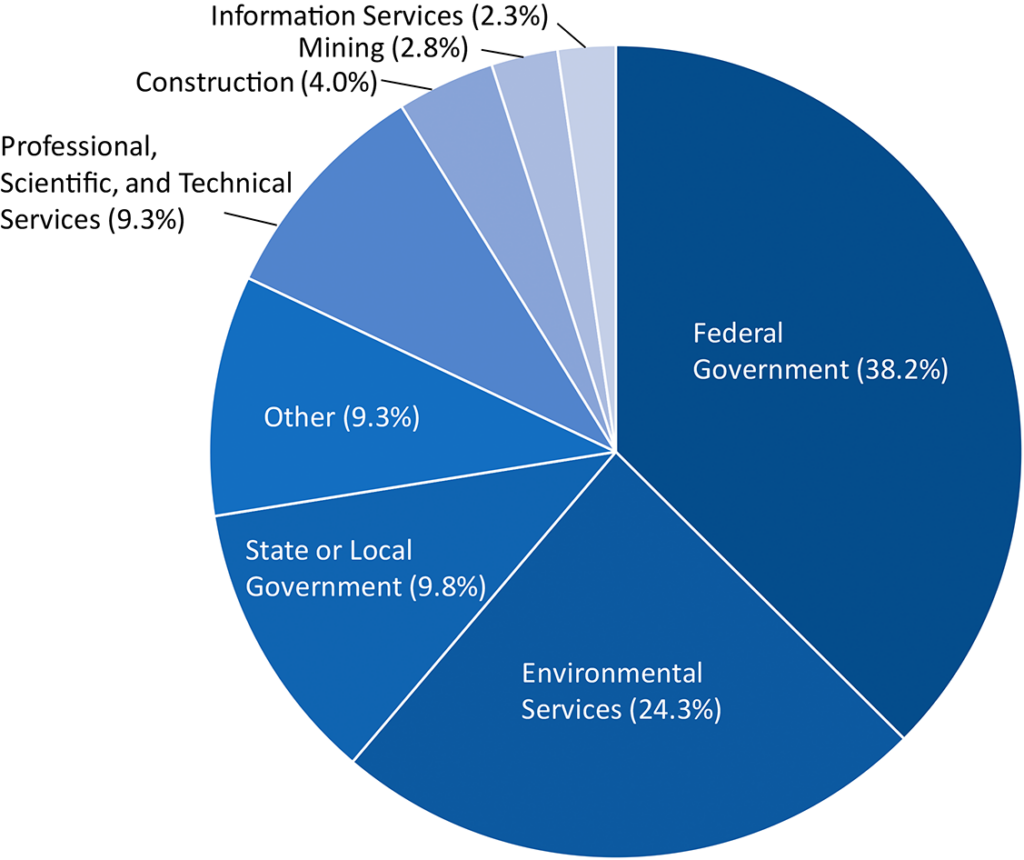Geoscience as a degree pathway and career trajectory is becoming more popular as opportunities expand. Jobs in geoscience are expected to grow by 5 – 10 % over the next decade, and college undergraduate programs are focusing heavily on recruitment. One of EarthScope’s core engagement goals is to support a highly trained geoscience workforce with well-developed and relevant skill sets. However, despite the successful examples of growth in the field, there are still barriers to overcome.
Geoscience degrees are not usually a first choice for incoming college students, and programs typically struggle to attract a diverse studentship. Additionally, many university degree programs do not tend to make job-finding resources readily available or incorporate developing in-demand skills into their present curricula. This struggling recruit-and-retain phenomenon creates a feedback loop in which students do not know the utility of geoscience degrees, which may make them less inclined to join a degree program or stay enrolled in one.
To combat this recruit-and-retain problem, Dr. Karen Viskupic shared insights from her curriculum at Boise State University introducing geoscience jobs to undergraduate students at this year’s NSF SAGE/GAGE Community Workshop. Viskupic is particularly interested in the development of inclusive teaching practices in undergraduate geoscience programs. The new work shared by Viskupic is underscored by a peer-reviewed research article that she co-authored on the identification of in-demand geoscience skills in the workforce. She has also co-authored a guide to implementing skill-building into an undergraduate curriculum. The guide is written for instructors looking for ways to help students in their courses and programs develop desired workforce skills.

In their paper, Viskupic and her team, led by Greg Shafer, analyzed 3,668 geoscience job adverts to characterize the types of skills and demands that employers of bachelor-level geoscience graduates look for. Viskupic then used this information to craft suggestions for skill development within Boise State’s geoscience department, where she teaches. She created a one-unit upper division undergraduate course focused on geoscience job options for interested students in her university’s geoscience degree program. The study characterizes the skills that the current geoscience workforce looks for in entry-level workers. This provided the basis for Viskupic’s curriculum to prepare students for geoscience job demands.
Top skills identified from the job adverts include robust field skills, quantitative ability, planning and communication skills, systems thinking, and physical abilities. Physical ability requirements, such as requiring job applicants to lift a certain weight or stand for a certain amount of time, is seldom linked to the job description itself and may discriminate against differently-abled applicants.
More discrepancies in requested skills and job adverts exist, such as in systems thinking. In a prior study of geoscience workforce skills, it was found that many employers in the field value what they define as systems thinking—the ability to collect, synthesize, and interpret information—as a valuable skill. Yet, these skills are not adequately reflected in the job adverts Viskupic and team surveyed. A gap in demand and training exists for key abilities, which suggests that broader dialog between university degree program designers and the geoscience workforce should be facilitated.
While university courses, like the one Viskupic has designed at Boise State, should and can be implemented as a way to bridge the gap between studentship and employment, broad research efforts can still support healthy workforce development. EarthScope is host to three distinct internship programs that aim to give students exposure to various employment tracts in geoscience. Additionally, EarthScope provides opportunities for students to gain and refine skills needed to join the workforce through short courses. A vibrant engagement initiative and strong presence on social media also aims to help increase accessibility to and interest in the broad applications of geoscience. Intern day-in-the-life videos help demonstrate the opportunities available to students while also giving them the agency to demonstrate their work to the broader community.
Viskupic and colleagues’ work supports the development of foundational knowledge for entry-level job candidates. Programs that craft curricula support skills that are in-demand in the workforce create opportunities for students to draw value from a degree that adequately prepares them for geoscience jobs. Additionally, backing for these skill-building opportunities informed by the real demands of the workforce is one way undergraduate degree programs can encourage students to enroll and complete geoscience degrees.

